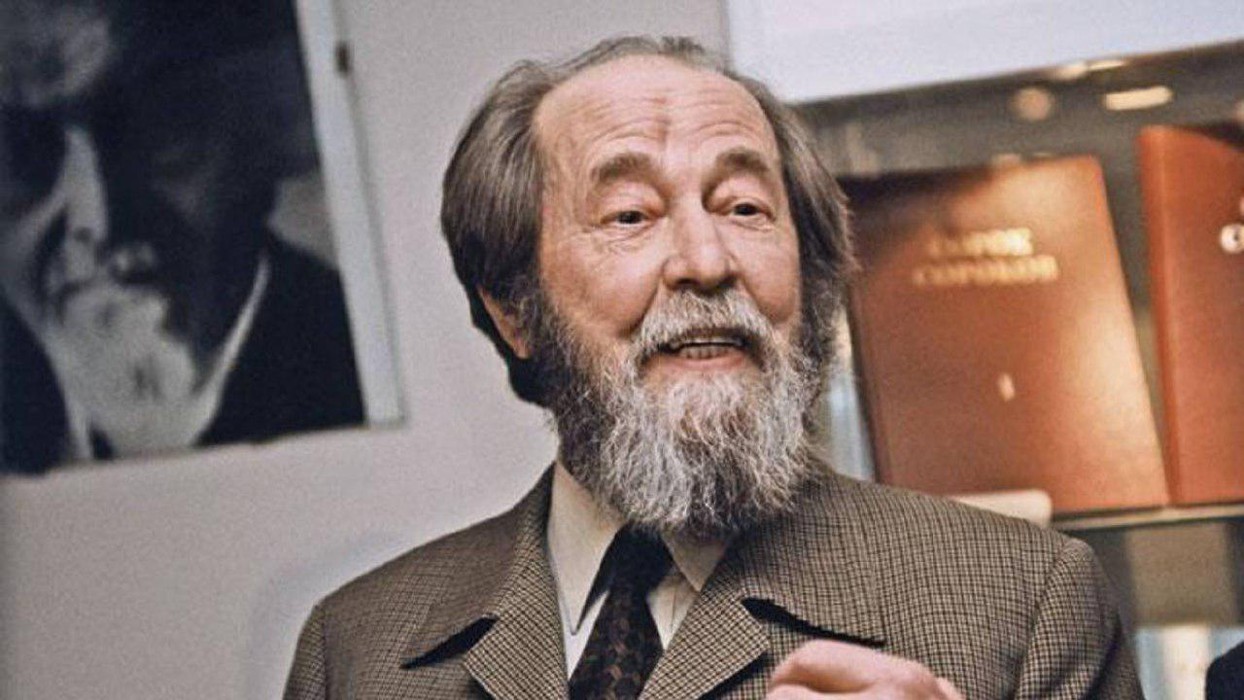In the May 12, 2022 edition of “The New York Review of Books,” Gary Saul Morson reviewed two recent translations of Alexander Solzhenitsyn’s novels, “The Red Wheel/Node III (8 March- 31 March):Book 3” and “Between Two Milestones: Book 2, Exile in America, 1978-1994.” Under normal circumstances I would not have raised an eyebrow, nor would I have read the review. But there is a war going on, an egregious manifestation of Russian imperialism. Solzhenitsyn, while a renowned dissident, was seldom identified as the Russian chauvinist and imperialist that he was.

Mr. Morson, anticipating the contemporary calumny of Russian imperialists, chose to write the following:
“Foreseeing the conflicts likely to arise eventually if Ukraine, with its large Russian-speaking population and its close cultural ties to Russia, chose to secede, Solzhenitsyn who considered himself both Russian and Ukrainian, hoped to preclude the devastating conflict we see today.”
In an apparent attempt to further mislead, Morson informs the reader that Solzhenitsyn’s mother’s maiden name was Scherbak, a Ukrainian name.
In fact, Solzhenitsyn was far removed from dual loyalty or democratic circumspection. He wrote after Ukraine’s independence:
“Not the whole of Ukraine in its current formal Soviet borders is indeed Ukraine. Some regions … clearly lean more towards Russia. As for Crimea, Khrushchev’s decision to hand it over to Ukraine was totally arbitrary.”
Morson is an equal opportunity denier or apologist. Many Jewish scholars have accused Solzhenitzyn of antisemitism. Morson does address the scourge of Russian antisemitism of which Solzhenitsyn was aware and sensitive. Morson points to Solzhenitsyn defending himself against that charge but never quite doing so successfully. Morson wrote, “The charge of anti-Semitism particularly offended Solzhenitsyn, who as some critics conceded, defended Jewish dissidents and the right of Jews to emigrate in order to avoid religious and other persecution in the USSR.”
However, Solzhenitsyn was enamoured of the czarist empire. He firmly believed in the reforms of the Russian czarist prime minister Stolypin who was assassinated in Kyiv and whose assassin happened to be Jewish, Dmitry Bogrov. It is noteworthy that Bogrov claimed his assassination of Stolypin was motivated as revenge for the antisemitism of the Russian Empire.
Solzhenitsyn’s Russian chauvinism and pro-czarist politics are largely responsible for accusations against him of being an anti-Semite. This issue was addressed by Morson in his review. What was not addressed was Solzhenitsyn’s view that Russia had to be Russian.
For Solzhenitsyn the fact that Jews constituted a disproportionate number of the Bolsheviks and their secret services underscored its non-Russian, internationalist nature. In fact, Jews made up a disproportionate number of communists in America in the 1930’s and 1940’s as well. Does noting this fact make one an anti-Semite? No it does not. However, stressing that fact and repeating it over and over in order to stir up animosity is a form of antisemitism. Indeed, in his “Two Hundred Years Together” Solzhenitsyn stressed that fact.
Why take on Solzhenitsyn? Because he was a very traditional, typical Russian and that makes him very dangerous. He was and remains respected highly in the West as the author of “The Gulag Archipelago” and other literary and dissident works. Together with Andrei Sakharov, he was the quintessential Russian Soviet dissident. But, unlike Solzhenitsyn, Sakharov was not a Russian imperialist.
Solzhenitsyn’s legacy of being a Russian anti-Ukrainian and anti-Semitic voice is as important as that of being a dissident and literary figure. Once the world recognises the Russian dark soul of Solzhenitsyn, it will recognise, or at least, begin to recognise this fundamental feature of Russian nature. These chauvinistic pronouncements of Solzhenitsyn are of special import today. As such it’s time to concede that Solzhenitsyn is to literature what Putin is to international relations, Morson’s apologies notwithstanding.
If President George W. Bush looked into Putin’s soul and came away, at least initially, with a favourable impression, only to be severely disillusioned, then a deeper look into a typical Russian soul such as that of Solzhenitsyn is crucial for global security.
A persistent nuclear Russian menace is not the world we want. It is equal to if not more dangerous than global warming. The lesson to be learned is that most Russians in terms of chauvinism and imperialism rise to the level at least of Alexander Solzhenitsyn, however much he is admired in the West. Thus, the demise of Vladimir Putin would be only a temporary reprieve.
Russian society is replete with chauvinists and imperialists. This requires much more than regime change. Persistent vigilance and a carrot and stick approach must be our mandate. Over the last fifteen years, from Russia’s invasion of Georgia, the invasion of Crimea and the Donbas, the MH17 killing of almost 300 innocents, the atrocities in Syria, Russia has not been held responsible for its grievous crimes. Lack of punishment emboldens criminals. My conclusion is that every Russian potentially has that criminal mentality, which may manifest itself when unchecked. It’s time to check Russian criminality and do so with such force that it makes a difference.
April 28, 2022 Askold S. Lozynskyj




